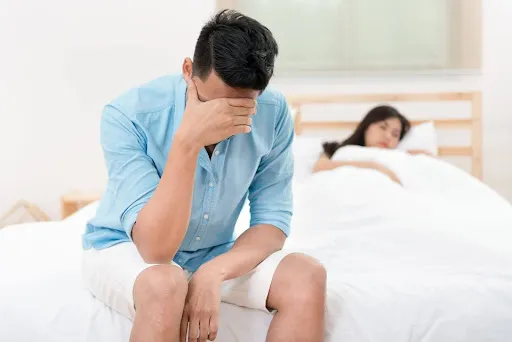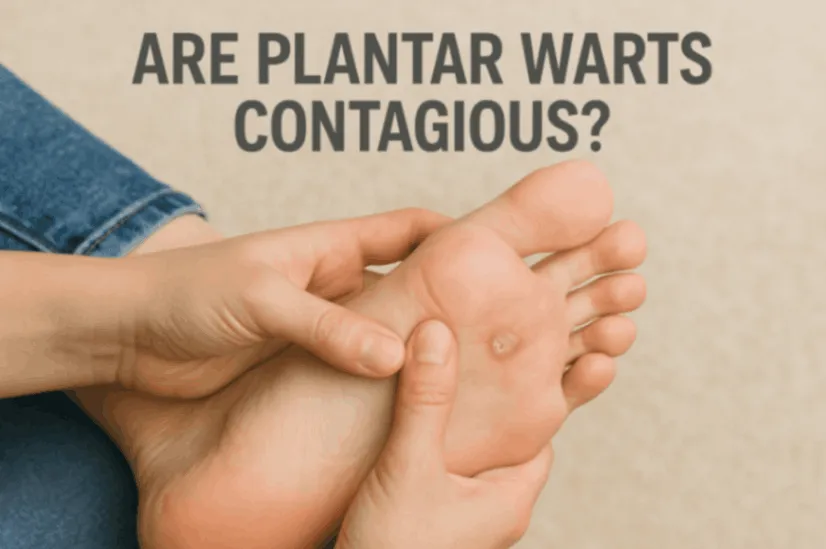An HPV infection with a low risk can result in genital warts. Topical prescription medications and surgical techniques are also possible therapy for warts.
Genital soft growths are called genital warts. They may itch, hurt, or make you feel uncomfortable.
They are Sexually Transmitted Infections (STIs) brought on by low-risk HPV strains. In contrast to the vulnerable strains that can cause cervical dysplasia and cancer, HPV 6 and HPV 11 are less dangerous.
The most prevalent STI is HPV, according to the Centres for Disease Control and Prevention (CDC). People who will engage in sexual activity are prone to HPV side effects, that is, genital warts.
Also Read: Most Common Sexually Transmitted Diseases in India
Are genital warts curable?
This question is frequently asked by individuals seeking information and understanding about their condition.
In order to get a deeper understanding of genital warts, including how they occur, their associated symptoms, underlying causes, and whether a cure is possible, continue reading below.
What are genital warts?
Small growths called genital warts can develop around the genitalia or the anus. Condylomata acuminata or venereal warts are other names for them. Sexually transmitted diseases like HPV are frequently linked to genital warts.
Warts can develop alone or in groups. Since genital warts can grow huge or small, measuring 5 millimeters or less. Typically, the warts are skin color or somewhat darker.
Where will genital warts occur?
You can get genital warts if you:
-
Groin region.
-
Anus.
-
Rectum.
-
Scrotum and penis.
-
Vulva, labia minora and majora, cervix, vagina (including the interior of your vagina), and vulva.
-
Mouth, tongue, lips, or throat.
Also Read: 6 Tips on How to Get Rid of Verrucas or Warts
How do genital warts develop?
Skin-to-skin contact with an infected person, commonly during vaginal, anal, and oral sex, is how you get genital warts. A penis doesn't need to enter a vagina or anus to get genital warts; they may occur even if no one touches them.
Although it's less frequent, you can transfer them even if you don't have any symptoms or obvious warts. During vaginal childbirth, genital warts can potentially be transmitted to the infant, but this is quite uncommon.
Warts on the genitalia are distinct from warts on other body parts. Therefore, you cannot get genital warts by contacting a wart on your hand or foot (or a partner).
When experiencing symptoms, you are more prone to transmitting genital warts. Therefore, to help reduce the chance of transmitting genital warts to a partner, it is essential to be checked and treated if you find a wart.
Also Read: How do a married women get HPV?
What are the signs and symptoms of genital warts?
Sexual activities, such as anal, vaginal, and oral intercourse, can spread genital warts. It may take weeks or months after infection before warts appear.
The human eye cannot usually see genital warts. They may be slightly darker or the same color as the skin. The growths' tops may have a cauliflower-like appearance and may be smooth or rough.
They might appear as a group of warts or as a single wart.
The following regions may experience genital warts in those born with a male gender assignment:
-
Penis.
-
Scrotum
-
groin
-
thighs
-
inside or close to the anus.
-
Within the anus or vagina.
-
Outside of the anus or vulvar.
-
Inside the cervix
A person who had oral intercourse with an HPV-positive individual runs the risk of developing genital warts on their lips, mouth, tongue, or neck as well.
Genital warts may still create symptoms even if you can't see them, like:
-
Vaginal discharge
-
Itching
-
bleeding
-
burning
What causes genital warts?
The National Cancer Institute estimates that low-risk HPV strains 6 and 11 are responsible for 90 percent of genital warts.
-
Only a handful of the 30 to 40 HPV strains that are especially harmful to the genitalia result in genital warts.
-
The HPV virus is regarded as an STI because of how easily it may spread through skin-to-skin contact.
-
The CDC reports that most sexually active persons get HPV at some time.
-
However, issues like genital warts aren't necessarily brought on by the virus. In reality, the virus typically disappears without posing any health risks.
-
Typically, HPV strains that are different from those that cause warts on hands or other regions of the body are to blame for genital warts.
Are genital warts curable?
Yes, genital warts are curable. While there is no cure for the underlying viral infection (human papillomavirus or HPV) that causes genital warts, the visible warts can be treated and removed.
Studies also suggest that various treatments can effectively remove genital warts, but it's important to note that these treatments do not eliminate the underlying human papillomavirus (HPV) infection.
Several treatment options are available to manage and eliminate genital warts, including topical medications, surgical procedures, and cryotherapy (freezing warts). It's important to consult with a healthcare professional for a proper diagnosis and to discuss the most appropriate treatment options based on your circumstances. Additionally, practicing safe intercourse and getting vaccinated against HPV can help prevent the transmission of the virus and reduce the risk of developing genital warts.
How can you cure genital warts?
Typically, HPV strains that are different from those that cause warts on hands or other regions of the body are to blame for genital warts.
While visible genital warts frequently disappear over time, HPV might stay in the skin's cells. This implies that you can experience multiple breakouts over your life.
Therefore, controlling symptoms is crucial to prevent the spreading of the illness to others. However, even in the absence of symptoms or visible warts, genital warts can spread to other people.
Genital warts may need to be treated to alleviate uncomfortable symptoms or to lessen their appearance. However, over-the-counter (OTC) wart removers and therapies cannot be used to treat genital warts.
Medications
Your doctor could advise topical wart remedies, such as:
-
(Aldara) imiquimod.
-
Podofilox (Condylox) and podophyllin.
-
TCA is for trichloracetic acid.
Also Read: How long does HPV take to show up in females
Surgery
Visible warts could require minor surgery to be removed if they don't disappear over time. These are the following treatments available to cure the wart,
-
electrocautery burning wart.
-
Warts can be frozen via cryosurgery.
-
Laser therapies.
-
Wart excision or removal.
-
The medication interferon injections.
-
Treatments at home for genital warts.
On genital warts, avoid using over-the-counter medications for hand warts.
Various HPV strains cause warts on the hands and in the genitalia. Treatments intended for other body parts are frequently far more potent than those utilized on the genitalia.
The improper therapies might harm health.
Some natural therapies are recommended for curing genital warts since warts can be curable, but they will always reoccur.
How can you prevent genital warts?
HPV vaccinations, condoms, and other barrier measures are readily accessible to help prevent genital warts:
Gardasil and Gardasil 9 can shield users of all genders against the most prevalent HPV strains that result in genital warts and types of HPV associated with cervical cancer.
The age range for receiving these vaccinations is 9 to 45. Depending on the age, they are given in a series of two or three injections. Given that both vaccines work best before exposure to HPV, both should be administered before the individual begins sexual activity.
Also Read: My partner has genital warts. Will I get it
How long does HPV take to show up on pop?
Many people are concerned about STDs like chlamydia or herpes. You also need to be aware of another quite typical one.
The human papillomavirus (HPV), which is the virus that causes genital warts, has probably been introduced to someone who engages in sexual activity. Genital warts appear as flesh-colored or white growths or lumps. They might be single or found in clusters, and they can be little or huge, elevated or flat.
Although genital warts often don't cause discomfort or itchiness, they can still transmit from person to person and are sometimes humiliating.
Genital warts and an elevated chance of getting certain cancers are two possible effects of the widespread STI HPV.
The virus that causes this illness may be present in the body but remain latent, meaning that no symptoms are present. The health concerns associated with dormant HPV infections often differ from those of an active case.
Since the virus is not actively generating symptoms or health issues in cases where it is latent, there is presently no particular therapy for this condition.
Also Read: Can genital warts go away?
How long does it take to show up?
It might be difficult to determine when you were infected because of the differing periods between getting the wart-causing HPV virus type and noticing the warts when they have formed.
The appearance of HPV warts often occurs three to six months following intercourse with an infected person, however, they can also take months or never emerge. The time between an HPV infection and an abnormality on a cervical smear might also differ from months to decades.
People who haven't engaged in sexual activity for a long time may get abnormal smears. Because of this, it might be challenging to pinpoint how or when you contracted the HPV virus.
Conclusion
Genital warts are a frequent and curable low-risk HPV infection consequence. They may eventually disappear, but being treated is crucial to avoiding their recurrence and potential problems.
Although genital warts often disappear independently, they might recur, even after treatment.
Although the virus that produces these warts has no known treatment, the body may eventually rid itself of the infection.
A healthcare professional can remove them in various methods, or someone can use prescription topical treatments at home.

Reviewed by







